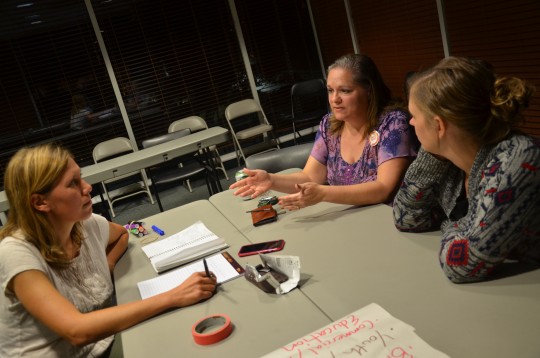
(Photo: M.Andersen/BikePortland)
A group of people who’ve lost family members on Portland-area streets has seen the success of their peers in New York City and is preparing to launch a similar organization here.
“I really am interested in behavior change, cultural change.”
— Kristi Finney
If you know anyone who has lost loved ones to traffic — whether the victim was walking, biking or driving — Oregon and SW Washington Families for Safe Streets is building its network in advance of a planned Nov. 15 launch.
Families for Safe Streets has been a key force behind New York’s rapid adoption of a Vision Zero policy that prioritizes traffic safety over traffic speed. This spring, NYC transportation advocate Paul Steely White told us he’d “never seen a campaign have so much influence over elected officials in such a sort time.”
Oregon and Southwest Washington Families for Safe Streets has been convened by safety advocate Kristi Finney, who lost her oldest son Dustin in 2011 when a young man driving drunk on Division hit him with his car and left the scene.
“I really am interested in behavior change, cultural change,” Finney said Monday. “People just get in their cars and think, you know, ‘accidents happen.’ And I can attest. I didn’t think much about accidents until it happened to us. And then that’s all I could think about.”
Advertisement
Finney, who lives in Vancouver, has spent years testifying for safety policies in Salem, Portland and elsewhere.
“My experience speaking in front of the legislature is that they really do respond much more empathetically to a family member,” she said. She hopes the new group will help get more people with her perspective on traffic violence talking to more politicians more often.
“I didn’t think much about accidents until it happened to us. And then that’s all I could think about.”
—Kristi Finney
Finney has been thinking for years about how to create such a network. In April 2014 she heard about the New York City group from Greg Raisman, a Portland Bureau of Transportation staffer who himself lost a close friend in a street collision. She reached out to their organizers to try learning more. Later, after hearing from Steph Noll of the Bicycle Transportation Alliance, Noel Mickelberry of Oregon Walks and Leah Treat of the PBOT, Finney started organizing locally.
Finney, Noll, Mickelberry and Melissa Hendricks Albright met Monday at Legacy Emanuel Hospital for one of a series of meetings that have so far brought several victims’ families together. They’ve created a closed Facebook group for victims of life-changing traffic collisions and their families as well as an open Facebook page for anyone who wants to follow the group’s activities.
Albright, who lost a loved one on Portland’s Marine Drive, said she agrees with Finney that a core goal is to help people understand that traffic collisions are public problems, not just personal ones.
“It’s a bigger deal than just getting behind the wheel,” she said. “It effects not just you.”
Finney said that’s something every road user should be able to agree on.
“I am really interested in promoting the fact that it really isn’t people on bikes or people walking,” she said. “It’s anybody. It can happen to anybody.”



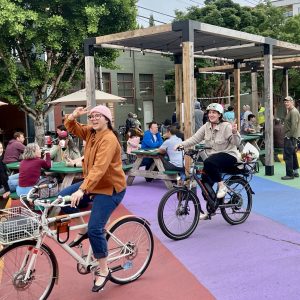
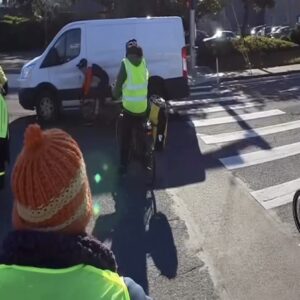
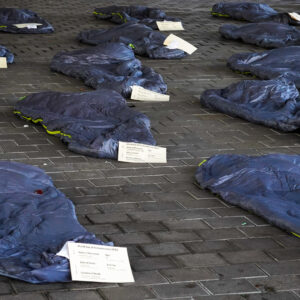
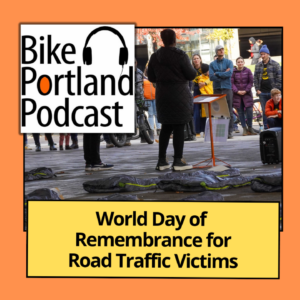
Thanks for reading.
BikePortland has served this community with independent community journalism since 2005. We rely on subscriptions from readers like you to survive. Your financial support is vital in keeping this valuable resource alive and well.
Please subscribe today to strengthen and expand our work.
Sad to say, the death-toll statistics aren’t horrific enough to get action from legislators and leaders. They have to see personal tears and weeping from family members to be moved.
That said, I’m grateful to these women for stepping up and being willing to turn their loss and grief into community good.
Simply removing the “level of service” doctrine from our engineering standards would allow for a great deal of positive change. As it currently stands, it’s next to impossible to do anything because one is not allowed to negatively impact the speed and flow of motorized traffic.
Good luck to them. We all need them to succeed.
Great point. They’ve started that ball in motion in California, so we’ll be watching to see what effects that has, and trying to ‘start that conversation’ at the county and city level. On a similar topic, I brought up Vision Zero at our last city BPAC meeting and mentioned our neighboring city just officially launched adoption (announced by the mayor), but nobody else had ever heard of it, so I pointed them here: http://bikesiliconvalley.org/resources/vision-zero-toolkit
B,
I would disagree with your blanket statement. LOS has it’s issues, the biggest being the naming scale of A to F, since most people confuse that with school grades. A is not the ‘best’ score so much as it is the ‘least delay’ and LOS scores have been developed for other modes than just autos.
The biggest issue is jurisdictions who don’t explain the meaning of the scales (intentionally or not) and who blindly aim for A or B.
C is, IMO, the highest any road should be ‘designed’ for and it should be a multi-modal average, not auto-centric. Portland considers D and E acceptable for auto traffic during peak hours and typically designs to that standard of delay.
What Anne said.
Very sorry for the losses of Finney, Albright, Raisman, et al. “People just get in their cars and think, you know, ‘accidents happen.’” That is so true. And our current laws seem to support that view. I’m incredibly grateful to these folks for trying to do something about unsafe driving here.
I know I’ve said it ad nauseam but the street I live on (SE 26th) is scaring me more every day. It’s clear that it’s the drivers who feel a sense of ownership of my street—not me or my neighbors. We all wait increasingly nervously on the periphery and feel the speeding car- and truck-generated wind in our hair, soak in the fumes, then make a mad dash for it, fingers crossed. Just to get across our own damned two-lane street to the other side. And this is a 25mph street with a school on it, lined with residences.
I hate it. I hate the way drivers feel comfortable driving recklessly and speeding on our neighborhood street, revving out of the intersections and gunning it; the cut-through and commuter drivers’ sense of entitlement to it. I’m very worried about whatever horrible “accident” will happen next. It’s only a matter of time. I’ll be glad to know how I might be able to help Finney and the rest in their cause.
This is so well written. Last month I was riding ~22 MPH on a residential road with a school, well-marked crosswalks, and a 25 MPH limit. In my mirror I watched a pickup close the gap behind me as I came upon a crosswalk with a Yield to Pedestrians bollard in the center. The road has no other markings (fog line, yellow stripe, etc.) and I was riding to the right but noticed the driver actually accelerate to pass, which would put us (very closely) next to each other in the narrowing created by the bollard. I signaled abruptly and moved over in front of him for that narrow stretch, then moved back to the right to let him pass. As he pulled up alongside (matching my 25 MPH speed at that point) he shouted “You shouldn’t ride in my lane, you’re gonna get killed that way.”
Fortunately I then needed to take a sharp right turn, but yes, the rationalization is absolutely mind boggling.
Terrible. I’m glad you’re safe. It’s infuriating to get a lecture from drivers like that.
There’s a lot of deep psychology going on about the average person’s reaction to traffic violence. Logic doesn’t seem to work. Risk assessment doesn’t matter. The settled argument in the mind that driving is essential to the functioning of life regardless of cost is not budged by new data regarding that cost. The conversation goes like this: “Sorry for your loss, but what am I supposed to do: stop driving?” and that’s the end of the conversation.
All the arguments we use to convince our cohort that traffic violence must stop do not work on those who don’t care. Maybe the best we can do is the direct emotional appeal, but even that I have my doubts about. I wish I had an answer. Good luck to the group, and I hope that they have an impact. I really do.
Well stated. What I wonder is why we don’t have photo radar ticketing EVERYWHERE. I want it on my street. Once drivers know they’ll get caught, they stop speeding. That is the deterrent. Drivers remember speed traps, and they slow down. I want speed traps everywhere. I don’t feel sorry for anyone getting caught in a speed trap, or getting caught speeding. Ticket them! Doesn’t the PPD need $$$? Why aren’t they ticketing the snot out of speeders and setting up speed traps on streets like SE 26th?
The police officers that I have had conversations with about the topic of writing traffic citations have generally told me that they hate writing tickets. They get abuse from the scofflaw and they don’t feel much sense of accomplishment because while they’re writing the ticket they see scores of other violations. There’s a sense of emptying the ocean with a teaspoon. They also think traffic patrol is like being a meter maid and is beneath them.
As far as the $$$$, I’m not sure the fines pay for the cost of enforcement and court time. I think we should add a public safety surcharge to every moving violation to rectify this if it is so, but motorists will scream “money grab” and the political tide is against such things because of Ferguson.
Thanks for the insight, B. Carfree. Egads, but that’s kind of…astounding. I don’t imagine much police work is terribly rewarding ever, but it’s kind of inherent in the job that you do unpleasant and uncomfortable and unrewarding things for the greater public good. Speeding and road safety’s no little issue–people are dying, in big numbers. Communities are literally split apart by roaring traffic and scofflaws. Portland’s quality of life is really suffering. If I were a cop, I would relish giving these guys tickets! What jerks! The scofflaws, I mean. And if they berated me, I’d give them two, with relish! 🙂 I really don’t understand that reasoning, or the other reasons given for the reluctance.
But, well, ok, then–they don’t have to demean themselves or experience the sense of futility, discomfort or shame. They can just put up photo radar and ticket that way. Voila! What’s stopping them from doing that?
I share your dismay at the noticeable increase in aggressive driving and seeming disregard for vulnerable users. But I’m surprised no one has answered your specific question. The reason we don’t have photo radar everywhere is a) it’s expensive, due to a police officer being required to staff what could be an automatic function [and there are only 6 to 12 traffic officers on duty for the whole city at a given time, so keeping them tied to a static location reduces coverage everywhere else], or b) it’s illegal.
On local streets, that is. It was a huge effort to get unstaffed photo radar approved for major, high-crash roadways (http://bikeportland.org/2015/07/06/photo-radar-bill-headed-governors-desk-signing-146936). Hopefully as this new tool is added to the toolkit we will see a more general effect on speeding – or at least free up some officers to do more enforcement on local streets.
What’s stopping them is that permanent photo radar is illegal per Oregon state law. Portland got a tiny exception for a few high crash corridors this legislative session. The prohibition on automated photo radar is an absurd law that needs to be lifted.
Rachel,
Movable photo radar vans, by state law, cannot be in any one location for more than two hours and must be manned.
I agree that the mindset for officers needs to change, as does the mindset of the courts. Speed kills. In a typical year, more people die from car crashes in Portland than homicides, so the highest impact on the safety of the average Portland citizen will be with speed enforcement.
I wonder how much speeding would drop if officers were required to cite for any speed more than 5 mph above the posted speed and courts could not reduce speeding fines at all? Initiative anyone?
Equity of enforcement is also cited as an issue with pursuing this part of VZ more aggressively. Fixed photo radar can avoid some of this aspect.
My dad is a retired CHP. His main job was to write tickets, mostly for speeding, and get drunk drivers off the road. (His other job was to do accident investigations and was also an EMT for emergency response). It’s interesting how attitudes change over the decades — while he certainly didn’t enjoy writing tickets, he knew first-hand that reducing speed made everything safer AND the tickets paid his salary (and for all the police force).
PPD has a much wider purview and responsibility than CHP (or the Oregon Highway Patrol), but that doesn’t mean they should shirk their responsibility to enforce the law (and make some revenue!).
Hoorah for your dad, Carrie! I am his fan! 🙂 And yikes, but I’ll bet that was a not-so-fun job…
I want to thank these families for transforming personal tragedy into advocacy for the rest of us.
I would like to thank our current city leaders for doing nothing to solve this problem. Talk is cheap.
Big thanks to these families for doing what they can.
The police officers that I have had conversations with about the topic of writing traffic citations have generally told me that they hate writing tickets. They get abuse from the scofflaw and they don’t feel much sense of accomplishment because while they’re writing the ticket they see scores of other violations. There’s a sense of emptying the ocean with a teaspoon. They also think traffic patrol is like being a meter maid and is beneath them.
As far as the $$$$, I’m not sure the fines pay for the cost of enforcement and court time. I think we should add a public safety surcharge to every moving violation to rectify this if it is so, but motorists will scream “money grab” and the political tide is against such things because of Ferguson.
Then automate ticket writing. When the bills don’t get paid, take the car.
The US Constiution and bill of rights were not written with cars in mind.
If I use my car to transport drugs, it can be confiscated. If I use it as a weapon, I have a right to keep it. Dumbfounding.